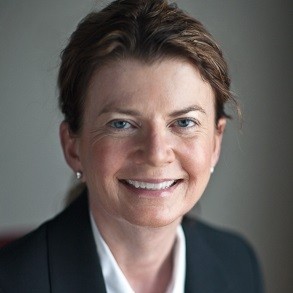-
SFNet Submits Request for Further Amendments to MSLP
After careful review, the Advocacy Committee of SFNet determined that we should provide additional comments to the Fed and Treasury in an effort to make the Main Street Loan Programs better suited to ABL lenders. Among key issues raised were (i) making it available to nondepository lenders so that they may, in turn, serve their borrowers; (ii) reducing the minimum on the MSELF from $10 million to $1 million; (iii) eliminating the requirement that any Main Street loans be pari passu with the ABL facility and collateral; (iv) ensuring that participation in the loans is guaranteed to be in the program prior to lender funding and (v) eliminating EBITDA as a metric for both eligibility and loan sizing. Please click here to view the letter.
-
Fifth Third Bank’s Chicago Chairman & CEO Mitchell Feiger to Retire
Fifth Third Bank, National Association, announced today that Mitchell Feiger, the chairman and CEO of Fifth Third Bank (Chicago), will retire on May 29, 2020. Succeeding him as the leader of the Chicago region will be Mark Hoppe, who had been named to the post of regional president in July 2019. Feiger had served in his current role since the merger of Fifth Third Bank and MB Financial in March 2019. He previously had served as president and CEO of MB Financial.
-
 PPE Funding Roundtable
Four executives from SFNet member companies discuss their experience in adapting to the surge of funding requests for personal protection equipment (PPE). TSL Express sat down with Jeff Goldrich, president and CEO, North Mill Capital; Edward King, founder and managing partner King Trade Capital; Paul Schuldiner, executive vice president and purchase order finance division manager, Rosenthal & Rosenthal; and Scott Winicour, CEO, Gibraltar Business Capital to learn more.
PPE Funding Roundtable
Four executives from SFNet member companies discuss their experience in adapting to the surge of funding requests for personal protection equipment (PPE). TSL Express sat down with Jeff Goldrich, president and CEO, North Mill Capital; Edward King, founder and managing partner King Trade Capital; Paul Schuldiner, executive vice president and purchase order finance division manager, Rosenthal & Rosenthal; and Scott Winicour, CEO, Gibraltar Business Capital to learn more. -
White Oak Commercial Finance Appoints Senior Portfolio Manager for Northeast Region
White Oak Commercial Finance is pleased to announce that Martin F. Efron has joined the firm as the portfolio manager in New York, serving the Northeast region. He will report to Bob Grbic, CEO and president of White Oak Commercial Finance.
-
MUFG Continues Expansion of Leveraged Finance Business with New Hires for U.S. Sales
Mitsubishi UFJ Financial Group (MUFG) has hired Marc Lavine and Diane Wright as Directors in MUFG's Leveraged Finance Sales group. Both will be based in New York and report to Timothy Fischer, Head of Leveraged Finance Sales in the Americas, who joined the company in January.
-
Coronavirus Economy Disrupts Bankruptcy Process
The coronavirus-triggered downturn is pushing default rates higher and is also affecting the bankruptcy procedures used to address such credit defaults, according to Fitch Ratings. Several recent debtors have had their bankruptcy cases derailed as ability to access exit financing markets has been compromised. Similarly, decreased lender appetite for equitized debt as well as lack of third party interest in certain distressed assets has also disrupted the streamlined trend of pre-coronavirus Chapter 11s. Lender fears with respect to DIP facilities as well as an increased frequency of liquidation outcomes will likely further impede the goal of preserving value in U.S. bankruptcies during the crisis. Given that recoveries are tied to distributable value, a prolonged pandemic may contribute to lower creditor recoveries for debtors with disrupted processes.
-
 A Gordon Brothers Perspective on the Economic Impacts of the Coronavirus
A Gordon Brothers Perspective on the Economic Impacts of the Coronavirus
As we make it to week seven of the coronavirus pandemic, it is hard not to reflect on this incredible period in history. The pandemic and the associated COVID-19 virus are an enigma that is bringing the world economy seemingly to its knees. First the virus was dismissed by the Western world as a mere flu-like illness originating in Asia, then an epidemic that might disrupt the Chinese economy, then an Italian problem, a cruise ship issue, a Washington state complication, and a New York dilemma. Now, it has finally been recognized for the major world concern that it is. The coronavirus has erupted into a global pandemic with over three million cases that will likely have a global and possibly U.S. pandemic-related death toll second only to the Spanish flu of 1918. We already know that this pandemic will have the greatest impact on the global economy since perhaps the bubonic plague of 1342, also known as the Black Death.
-
 Main Street Loan Program Update
Main Street Loan Program Update
On April 30, 2020, the Federal Reserve updated its Main Street Loan Program (“MSLP”) terms based on thousands of comments (including comments from Secured Finance Network) submitted since the program was initially announced on April 9, 2020. Several important updates were made to the MSLP, though many changes of interest to asset-based lenders were contemplated but not fully developed in this new guidance.[1] In particular, asset-based lenders will likely need to consider the impact of MSLP terms described below on existing financing structures, such as the pari passu treatment of collateral, which could dilute existing lender security in some cases, the continued reliance on EBITDA and risk ratings as metrics for determining borrower eligibility and the restrictions on assignments by MSLP lenders.
-
Recalibration of the Asset Footprint Focusing on International Platforms in Bankruptcy or Insolvency
Cross-border loan workouts and enforcement of security interests across multiple jurisdictions is a complex matter and greatly depends on the venue of the insolvency and the location of the collateral. These factors are also intertwined with the overall reach of the credit facility. A deep understanding of the multiplicity of issues that may arise during a workout or insolvency can not only enhance a lender’s ability to be made whole in an enforcement scenario, but can also create opportunity for liquidity providers to expand their geographic offerings and create unique value for their global borrowers.
-
 The Staged Return to Normal
The Staged Return to Normal
We all want to return to normal, or the new normal, as quickly as possible. The question businesses and their stakeholders need to ask themselves is what does normal mean and how can the return be funded.
For most companies, their working capital has been depleted during the shutdown as they struggled to pay employees and keep vendors satisfied, while dealing with impacts to sales and accounts receivable.
-
J. Crew Files for Bankruptcy in Virus’s First Big Retail Casualty
J. Crew announced that its parent company, Chinos Holdings, had filed for Chapter 11 protection in federal bankruptcy court for the Eastern District of Virginia. As part of its financial reorganization plan, it will hand over control to top creditors, including the hedge fund Anchorage Capital, by converting $1.65 billion of its debt into equity. The company also plans to hold onto its Madewell brand, which it had considered spinning off into a public company.
-
 PPPLF Update and Summary
PPPLF Update and Summary
On April 30, 2020, the Federal Reserve announced that it is expanding eligibility to participate in the Federal Reserve’s Paycheck Protection Program Liquidity Facility (the “PPPLF”) to all lenders eligible to originate Paycheck Protection Program loans.[1] The PPPLF permits eligible PPP lenders to pledge PPP loan notes to the Federal Reserve in exchange for a low interest, non-recourse loan from the Federal Reserve in the amount of the pledged PPP loan note.
Program Update
When originally announced, the PPPLF was only available to PPP lenders that are depository institutions. Now, all PPP lenders approved by the SBA, including banks, credit unions, Community Development Financial Institutions, members of the Farm Credit System, small business lending companies licensed by the SBA, and some financial technology firms, are eligible to participate in the PPPLF.
-
Twin River Secures $275 Million Of Additional Financing
Twin River Worldwide Holdings, Inc. (NYSE: TRWH) announced today that it had successfully syndicated an expansion to the term loan facility in its existing bank credit agreement by $275 million. Funding, which is expected to occur on May 11, 2020, is subject to final documentation and customary conditions.
Borrowings under the expanded term loan facility will bear interest at LIBOR + 8.00% per annum through the 2026 maturity date. The loan will be issued with an original issue discount of 97 and will be non-callable for 18 months. After 18 months the loan is callable at a price of 104.5% of par, and after 30 months the loan is callable at par.
-
 SFNet 2019 Annual Factoring Survey Analysis
SFNet 2019 Annual Factoring Survey Analysis
The data in this Annual Factoring Industry Survey presents results from a period that now seems like a distant memory. Sitting down to write commentary was very challenging. Commenting on the past year seemed moot; and attempting to correlate or speculate on the future of our industry seems a fools’ errand.
One thing to keep in mind is that receivables factoring is a an “all-seasons competitor” in the world of finance. Factoring is a product that has been around for hundreds, if not thousands, of years, and so I am confident that it, like our economy, will weather the current stormy global conditions stemming from the pandemic. In fact, it is more likely that the industry will grow and thrive during this time of stress and uncertainty. The very design and nature of accounts receivable factoring is ideally suited for providing liquidity to businesses in times of financial, operational stress and uneven cash flow.
-
 Managing C&I Risk in a Time of Pandemic
Commercial lenders will face many new and unique challenges over the coming months as the full effects of the coronavirus pandemic are felt throughout the economy. For commercial customers cash flow, liquidity, and credit tightening dramatically across industries is the new normal. In these uncertain times, no segment of the bank commercial portfolio is under as much short- and long-term risk as the commercial and industrial (C&I) line of credit segment.
Managing C&I Risk in a Time of Pandemic
Commercial lenders will face many new and unique challenges over the coming months as the full effects of the coronavirus pandemic are felt throughout the economy. For commercial customers cash flow, liquidity, and credit tightening dramatically across industries is the new normal. In these uncertain times, no segment of the bank commercial portfolio is under as much short- and long-term risk as the commercial and industrial (C&I) line of credit segment. -
Small Bank Loan Growth Jumps as PPP Funding Ramps Up
Commercial loan growth reaccelerated across much of the U.S. banking industry as lenders began to fund federally backed small business loans and prepared to start processing a second round of applications under the coronavirus relief program.
Excluding the 25 largest institutions by assets, commercial and industrial loans increased 6.3% during the week ended April 15, according to seasonally adjusted data in the Federal Reserve's most recent H.8 report on commercial banks. That represents a huge jump from growth rates of 0.6% to 0.8% in the preceding two weeks, and leapfrogs growth of 2.1% to 2.3% during two weeks in March when corporate draws against bank credit lines were particularly heavy.
-
 Aftermath
Aftermath means the consequences or aftereffects of a significant unpleasant event, like Covid-19. The financial system is going to experience this first-hand. No firm, whether it be bank or non-bank, will be left unscathed. The author is purposely writing this article now in order to predict that one of the many untold stories will be that the nation’s biggest banks were expecting the unexpected as it pertains to their middle-market C&I and ABL portfolios. Clearly, no bank in the country could have imagined a complete shutdown based on a virus, but what they could and did imagine was a severe depression irrespective of the cause. Not only were they expecting, but they were prepared in unexpected ways. The same cannot be said for certain community and regional banks and BDCs, which might not have had the resources, scale or wherewithal to prepare.
Aftermath
Aftermath means the consequences or aftereffects of a significant unpleasant event, like Covid-19. The financial system is going to experience this first-hand. No firm, whether it be bank or non-bank, will be left unscathed. The author is purposely writing this article now in order to predict that one of the many untold stories will be that the nation’s biggest banks were expecting the unexpected as it pertains to their middle-market C&I and ABL portfolios. Clearly, no bank in the country could have imagined a complete shutdown based on a virus, but what they could and did imagine was a severe depression irrespective of the cause. Not only were they expecting, but they were prepared in unexpected ways. The same cannot be said for certain community and regional banks and BDCs, which might not have had the resources, scale or wherewithal to prepare. -
North Mill Capital Provides $15 Million Accounts Receivable Factoring Facility
North Mill Capital announced it provided a $15,000,000 accounts receivable factoring facility to provider of oral and personal hygiene products.
The funds were used to pay off the previous lender and provide additional working capital to support the Company's growth. NMC also entered into an inter-creditor agreement with a purchase order financing partner to help meet substantial near-term growth needs.
-
Reaching the Top: C-Suite Women in Secured Finance Roundtable
What does it take to break the proverbial glass ceiling in secured finance? What does the journey to the “top” look like for women in financial services? We interviewed four C-Suite women and here is what they had to say. The women we spoke with are Meredith Carter, president and CEO, Context Business Lending; Miin Chen, COO, Siena Lending Group; Deborah Monosson, president & CEO, Boston Financial & Equity Corporation; and Jennifer Yount, partner, Paul Hastings LLP.
-
 Women Leaders Talk About Advancing in the Ranks
Women Leaders Talk About Advancing in the Ranks
Secured Finance executives and an executive recruiter discuss how the industry can attract and retain more women.
-
SFNet Submits Request for Further Amendments to MSLP
After careful review, the Advocacy Committee of SFNet determined that we should provide additional comments to the Fed and Treasury in an effort to make the Main Street Loan Programs better suited to ABL lenders. Among key issues raised were (i) making it available to nondepository lenders so that they may, in turn, serve their borrowers; (ii) reducing the minimum on the MSELF from $10 million to $1 million; (iii) eliminating the requirement that any Main Street loans be pari passu with the ABL facility and collateral; (iv) ensuring that participation in the loans is guaranteed to be in the program prior to lender funding and (v) eliminating EBITDA as a metric for both eligibility and loan sizing. Please click here to view the letter.
-
Fifth Third Bank’s Chicago Chairman & CEO Mitchell Feiger to Retire
Fifth Third Bank, National Association, announced today that Mitchell Feiger, the chairman and CEO of Fifth Third Bank (Chicago), will retire on May 29, 2020. Succeeding him as the leader of the Chicago region will be Mark Hoppe, who had been named to the post of regional president in July 2019. Feiger had served in his current role since the merger of Fifth Third Bank and MB Financial in March 2019. He previously had served as president and CEO of MB Financial.
-
 PPE Funding Roundtable
Four executives from SFNet member companies discuss their experience in adapting to the surge of funding requests for personal protection equipment (PPE). TSL Express sat down with Jeff Goldrich, president and CEO, North Mill Capital; Edward King, founder and managing partner King Trade Capital; Paul Schuldiner, executive vice president and purchase order finance division manager, Rosenthal & Rosenthal; and Scott Winicour, CEO, Gibraltar Business Capital to learn more.
PPE Funding Roundtable
Four executives from SFNet member companies discuss their experience in adapting to the surge of funding requests for personal protection equipment (PPE). TSL Express sat down with Jeff Goldrich, president and CEO, North Mill Capital; Edward King, founder and managing partner King Trade Capital; Paul Schuldiner, executive vice president and purchase order finance division manager, Rosenthal & Rosenthal; and Scott Winicour, CEO, Gibraltar Business Capital to learn more. -
White Oak Commercial Finance Appoints Senior Portfolio Manager for Northeast Region
White Oak Commercial Finance is pleased to announce that Martin F. Efron has joined the firm as the portfolio manager in New York, serving the Northeast region. He will report to Bob Grbic, CEO and president of White Oak Commercial Finance.
-
MUFG Continues Expansion of Leveraged Finance Business with New Hires for U.S. Sales
Mitsubishi UFJ Financial Group (MUFG) has hired Marc Lavine and Diane Wright as Directors in MUFG's Leveraged Finance Sales group. Both will be based in New York and report to Timothy Fischer, Head of Leveraged Finance Sales in the Americas, who joined the company in January.
-
Coronavirus Economy Disrupts Bankruptcy Process
The coronavirus-triggered downturn is pushing default rates higher and is also affecting the bankruptcy procedures used to address such credit defaults, according to Fitch Ratings. Several recent debtors have had their bankruptcy cases derailed as ability to access exit financing markets has been compromised. Similarly, decreased lender appetite for equitized debt as well as lack of third party interest in certain distressed assets has also disrupted the streamlined trend of pre-coronavirus Chapter 11s. Lender fears with respect to DIP facilities as well as an increased frequency of liquidation outcomes will likely further impede the goal of preserving value in U.S. bankruptcies during the crisis. Given that recoveries are tied to distributable value, a prolonged pandemic may contribute to lower creditor recoveries for debtors with disrupted processes.
-
 A Gordon Brothers Perspective on the Economic Impacts of the Coronavirus
A Gordon Brothers Perspective on the Economic Impacts of the Coronavirus
As we make it to week seven of the coronavirus pandemic, it is hard not to reflect on this incredible period in history. The pandemic and the associated COVID-19 virus are an enigma that is bringing the world economy seemingly to its knees. First the virus was dismissed by the Western world as a mere flu-like illness originating in Asia, then an epidemic that might disrupt the Chinese economy, then an Italian problem, a cruise ship issue, a Washington state complication, and a New York dilemma. Now, it has finally been recognized for the major world concern that it is. The coronavirus has erupted into a global pandemic with over three million cases that will likely have a global and possibly U.S. pandemic-related death toll second only to the Spanish flu of 1918. We already know that this pandemic will have the greatest impact on the global economy since perhaps the bubonic plague of 1342, also known as the Black Death.
-
 Main Street Loan Program Update
Main Street Loan Program Update
On April 30, 2020, the Federal Reserve updated its Main Street Loan Program (“MSLP”) terms based on thousands of comments (including comments from Secured Finance Network) submitted since the program was initially announced on April 9, 2020. Several important updates were made to the MSLP, though many changes of interest to asset-based lenders were contemplated but not fully developed in this new guidance.[1] In particular, asset-based lenders will likely need to consider the impact of MSLP terms described below on existing financing structures, such as the pari passu treatment of collateral, which could dilute existing lender security in some cases, the continued reliance on EBITDA and risk ratings as metrics for determining borrower eligibility and the restrictions on assignments by MSLP lenders.
-
Recalibration of the Asset Footprint Focusing on International Platforms in Bankruptcy or Insolvency
Cross-border loan workouts and enforcement of security interests across multiple jurisdictions is a complex matter and greatly depends on the venue of the insolvency and the location of the collateral. These factors are also intertwined with the overall reach of the credit facility. A deep understanding of the multiplicity of issues that may arise during a workout or insolvency can not only enhance a lender’s ability to be made whole in an enforcement scenario, but can also create opportunity for liquidity providers to expand their geographic offerings and create unique value for their global borrowers.
-
 The Staged Return to Normal
The Staged Return to Normal
We all want to return to normal, or the new normal, as quickly as possible. The question businesses and their stakeholders need to ask themselves is what does normal mean and how can the return be funded.
For most companies, their working capital has been depleted during the shutdown as they struggled to pay employees and keep vendors satisfied, while dealing with impacts to sales and accounts receivable.
-
J. Crew Files for Bankruptcy in Virus’s First Big Retail Casualty
J. Crew announced that its parent company, Chinos Holdings, had filed for Chapter 11 protection in federal bankruptcy court for the Eastern District of Virginia. As part of its financial reorganization plan, it will hand over control to top creditors, including the hedge fund Anchorage Capital, by converting $1.65 billion of its debt into equity. The company also plans to hold onto its Madewell brand, which it had considered spinning off into a public company.
-
 PPPLF Update and Summary
PPPLF Update and Summary
On April 30, 2020, the Federal Reserve announced that it is expanding eligibility to participate in the Federal Reserve’s Paycheck Protection Program Liquidity Facility (the “PPPLF”) to all lenders eligible to originate Paycheck Protection Program loans.[1] The PPPLF permits eligible PPP lenders to pledge PPP loan notes to the Federal Reserve in exchange for a low interest, non-recourse loan from the Federal Reserve in the amount of the pledged PPP loan note.
Program Update
When originally announced, the PPPLF was only available to PPP lenders that are depository institutions. Now, all PPP lenders approved by the SBA, including banks, credit unions, Community Development Financial Institutions, members of the Farm Credit System, small business lending companies licensed by the SBA, and some financial technology firms, are eligible to participate in the PPPLF.
-
Twin River Secures $275 Million Of Additional Financing
Twin River Worldwide Holdings, Inc. (NYSE: TRWH) announced today that it had successfully syndicated an expansion to the term loan facility in its existing bank credit agreement by $275 million. Funding, which is expected to occur on May 11, 2020, is subject to final documentation and customary conditions.
Borrowings under the expanded term loan facility will bear interest at LIBOR + 8.00% per annum through the 2026 maturity date. The loan will be issued with an original issue discount of 97 and will be non-callable for 18 months. After 18 months the loan is callable at a price of 104.5% of par, and after 30 months the loan is callable at par.
-
 SFNet 2019 Annual Factoring Survey Analysis
SFNet 2019 Annual Factoring Survey Analysis
The data in this Annual Factoring Industry Survey presents results from a period that now seems like a distant memory. Sitting down to write commentary was very challenging. Commenting on the past year seemed moot; and attempting to correlate or speculate on the future of our industry seems a fools’ errand.
One thing to keep in mind is that receivables factoring is a an “all-seasons competitor” in the world of finance. Factoring is a product that has been around for hundreds, if not thousands, of years, and so I am confident that it, like our economy, will weather the current stormy global conditions stemming from the pandemic. In fact, it is more likely that the industry will grow and thrive during this time of stress and uncertainty. The very design and nature of accounts receivable factoring is ideally suited for providing liquidity to businesses in times of financial, operational stress and uneven cash flow.
-
 Managing C&I Risk in a Time of Pandemic
Commercial lenders will face many new and unique challenges over the coming months as the full effects of the coronavirus pandemic are felt throughout the economy. For commercial customers cash flow, liquidity, and credit tightening dramatically across industries is the new normal. In these uncertain times, no segment of the bank commercial portfolio is under as much short- and long-term risk as the commercial and industrial (C&I) line of credit segment.
Managing C&I Risk in a Time of Pandemic
Commercial lenders will face many new and unique challenges over the coming months as the full effects of the coronavirus pandemic are felt throughout the economy. For commercial customers cash flow, liquidity, and credit tightening dramatically across industries is the new normal. In these uncertain times, no segment of the bank commercial portfolio is under as much short- and long-term risk as the commercial and industrial (C&I) line of credit segment. -
Small Bank Loan Growth Jumps as PPP Funding Ramps Up
Commercial loan growth reaccelerated across much of the U.S. banking industry as lenders began to fund federally backed small business loans and prepared to start processing a second round of applications under the coronavirus relief program.
Excluding the 25 largest institutions by assets, commercial and industrial loans increased 6.3% during the week ended April 15, according to seasonally adjusted data in the Federal Reserve's most recent H.8 report on commercial banks. That represents a huge jump from growth rates of 0.6% to 0.8% in the preceding two weeks, and leapfrogs growth of 2.1% to 2.3% during two weeks in March when corporate draws against bank credit lines were particularly heavy.
-
 Aftermath
Aftermath means the consequences or aftereffects of a significant unpleasant event, like Covid-19. The financial system is going to experience this first-hand. No firm, whether it be bank or non-bank, will be left unscathed. The author is purposely writing this article now in order to predict that one of the many untold stories will be that the nation’s biggest banks were expecting the unexpected as it pertains to their middle-market C&I and ABL portfolios. Clearly, no bank in the country could have imagined a complete shutdown based on a virus, but what they could and did imagine was a severe depression irrespective of the cause. Not only were they expecting, but they were prepared in unexpected ways. The same cannot be said for certain community and regional banks and BDCs, which might not have had the resources, scale or wherewithal to prepare.
Aftermath
Aftermath means the consequences or aftereffects of a significant unpleasant event, like Covid-19. The financial system is going to experience this first-hand. No firm, whether it be bank or non-bank, will be left unscathed. The author is purposely writing this article now in order to predict that one of the many untold stories will be that the nation’s biggest banks were expecting the unexpected as it pertains to their middle-market C&I and ABL portfolios. Clearly, no bank in the country could have imagined a complete shutdown based on a virus, but what they could and did imagine was a severe depression irrespective of the cause. Not only were they expecting, but they were prepared in unexpected ways. The same cannot be said for certain community and regional banks and BDCs, which might not have had the resources, scale or wherewithal to prepare. -
North Mill Capital Provides $15 Million Accounts Receivable Factoring Facility
North Mill Capital announced it provided a $15,000,000 accounts receivable factoring facility to provider of oral and personal hygiene products.
The funds were used to pay off the previous lender and provide additional working capital to support the Company's growth. NMC also entered into an inter-creditor agreement with a purchase order financing partner to help meet substantial near-term growth needs.
-
Reaching the Top: C-Suite Women in Secured Finance Roundtable
What does it take to break the proverbial glass ceiling in secured finance? What does the journey to the “top” look like for women in financial services? We interviewed four C-Suite women and here is what they had to say. The women we spoke with are Meredith Carter, president and CEO, Context Business Lending; Miin Chen, COO, Siena Lending Group; Deborah Monosson, president & CEO, Boston Financial & Equity Corporation; and Jennifer Yount, partner, Paul Hastings LLP.
-
 Women Leaders Talk About Advancing in the Ranks
Women Leaders Talk About Advancing in the Ranks
Secured Finance executives and an executive recruiter discuss how the industry can attract and retain more women.
-
SFNet Submits Request for Further Amendments to MSLP
After careful review, the Advocacy Committee of SFNet determined that we should provide additional comments to the Fed and Treasury in an effort to make the Main Street Loan Programs better suited to ABL lenders. Among key issues raised were (i) making it available to nondepository lenders so that they may, in turn, serve their borrowers; (ii) reducing the minimum on the MSELF from $10 million to $1 million; (iii) eliminating the requirement that any Main Street loans be pari passu with the ABL facility and collateral; (iv) ensuring that participation in the loans is guaranteed to be in the program prior to lender funding and (v) eliminating EBITDA as a metric for both eligibility and loan sizing. Please click here to view the letter.
-
Fifth Third Bank’s Chicago Chairman & CEO Mitchell Feiger to Retire
Fifth Third Bank, National Association, announced today that Mitchell Feiger, the chairman and CEO of Fifth Third Bank (Chicago), will retire on May 29, 2020. Succeeding him as the leader of the Chicago region will be Mark Hoppe, who had been named to the post of regional president in July 2019. Feiger had served in his current role since the merger of Fifth Third Bank and MB Financial in March 2019. He previously had served as president and CEO of MB Financial.
-
 PPE Funding Roundtable
Four executives from SFNet member companies discuss their experience in adapting to the surge of funding requests for personal protection equipment (PPE). TSL Express sat down with Jeff Goldrich, president and CEO, North Mill Capital; Edward King, founder and managing partner King Trade Capital; Paul Schuldiner, executive vice president and purchase order finance division manager, Rosenthal & Rosenthal; and Scott Winicour, CEO, Gibraltar Business Capital to learn more.
PPE Funding Roundtable
Four executives from SFNet member companies discuss their experience in adapting to the surge of funding requests for personal protection equipment (PPE). TSL Express sat down with Jeff Goldrich, president and CEO, North Mill Capital; Edward King, founder and managing partner King Trade Capital; Paul Schuldiner, executive vice president and purchase order finance division manager, Rosenthal & Rosenthal; and Scott Winicour, CEO, Gibraltar Business Capital to learn more. -
White Oak Commercial Finance Appoints Senior Portfolio Manager for Northeast Region
White Oak Commercial Finance is pleased to announce that Martin F. Efron has joined the firm as the portfolio manager in New York, serving the Northeast region. He will report to Bob Grbic, CEO and president of White Oak Commercial Finance.
-
MUFG Continues Expansion of Leveraged Finance Business with New Hires for U.S. Sales
Mitsubishi UFJ Financial Group (MUFG) has hired Marc Lavine and Diane Wright as Directors in MUFG's Leveraged Finance Sales group. Both will be based in New York and report to Timothy Fischer, Head of Leveraged Finance Sales in the Americas, who joined the company in January.
-
Coronavirus Economy Disrupts Bankruptcy Process
The coronavirus-triggered downturn is pushing default rates higher and is also affecting the bankruptcy procedures used to address such credit defaults, according to Fitch Ratings. Several recent debtors have had their bankruptcy cases derailed as ability to access exit financing markets has been compromised. Similarly, decreased lender appetite for equitized debt as well as lack of third party interest in certain distressed assets has also disrupted the streamlined trend of pre-coronavirus Chapter 11s. Lender fears with respect to DIP facilities as well as an increased frequency of liquidation outcomes will likely further impede the goal of preserving value in U.S. bankruptcies during the crisis. Given that recoveries are tied to distributable value, a prolonged pandemic may contribute to lower creditor recoveries for debtors with disrupted processes.
-
 A Gordon Brothers Perspective on the Economic Impacts of the Coronavirus
A Gordon Brothers Perspective on the Economic Impacts of the Coronavirus
As we make it to week seven of the coronavirus pandemic, it is hard not to reflect on this incredible period in history. The pandemic and the associated COVID-19 virus are an enigma that is bringing the world economy seemingly to its knees. First the virus was dismissed by the Western world as a mere flu-like illness originating in Asia, then an epidemic that might disrupt the Chinese economy, then an Italian problem, a cruise ship issue, a Washington state complication, and a New York dilemma. Now, it has finally been recognized for the major world concern that it is. The coronavirus has erupted into a global pandemic with over three million cases that will likely have a global and possibly U.S. pandemic-related death toll second only to the Spanish flu of 1918. We already know that this pandemic will have the greatest impact on the global economy since perhaps the bubonic plague of 1342, also known as the Black Death.
-
 Main Street Loan Program Update
Main Street Loan Program Update
On April 30, 2020, the Federal Reserve updated its Main Street Loan Program (“MSLP”) terms based on thousands of comments (including comments from Secured Finance Network) submitted since the program was initially announced on April 9, 2020. Several important updates were made to the MSLP, though many changes of interest to asset-based lenders were contemplated but not fully developed in this new guidance.[1] In particular, asset-based lenders will likely need to consider the impact of MSLP terms described below on existing financing structures, such as the pari passu treatment of collateral, which could dilute existing lender security in some cases, the continued reliance on EBITDA and risk ratings as metrics for determining borrower eligibility and the restrictions on assignments by MSLP lenders.
-
Recalibration of the Asset Footprint Focusing on International Platforms in Bankruptcy or Insolvency
Cross-border loan workouts and enforcement of security interests across multiple jurisdictions is a complex matter and greatly depends on the venue of the insolvency and the location of the collateral. These factors are also intertwined with the overall reach of the credit facility. A deep understanding of the multiplicity of issues that may arise during a workout or insolvency can not only enhance a lender’s ability to be made whole in an enforcement scenario, but can also create opportunity for liquidity providers to expand their geographic offerings and create unique value for their global borrowers.
-
 The Staged Return to Normal
The Staged Return to Normal
We all want to return to normal, or the new normal, as quickly as possible. The question businesses and their stakeholders need to ask themselves is what does normal mean and how can the return be funded.
For most companies, their working capital has been depleted during the shutdown as they struggled to pay employees and keep vendors satisfied, while dealing with impacts to sales and accounts receivable.
-
J. Crew Files for Bankruptcy in Virus’s First Big Retail Casualty
J. Crew announced that its parent company, Chinos Holdings, had filed for Chapter 11 protection in federal bankruptcy court for the Eastern District of Virginia. As part of its financial reorganization plan, it will hand over control to top creditors, including the hedge fund Anchorage Capital, by converting $1.65 billion of its debt into equity. The company also plans to hold onto its Madewell brand, which it had considered spinning off into a public company.
-
 PPPLF Update and Summary
PPPLF Update and Summary
On April 30, 2020, the Federal Reserve announced that it is expanding eligibility to participate in the Federal Reserve’s Paycheck Protection Program Liquidity Facility (the “PPPLF”) to all lenders eligible to originate Paycheck Protection Program loans.[1] The PPPLF permits eligible PPP lenders to pledge PPP loan notes to the Federal Reserve in exchange for a low interest, non-recourse loan from the Federal Reserve in the amount of the pledged PPP loan note.
Program Update
When originally announced, the PPPLF was only available to PPP lenders that are depository institutions. Now, all PPP lenders approved by the SBA, including banks, credit unions, Community Development Financial Institutions, members of the Farm Credit System, small business lending companies licensed by the SBA, and some financial technology firms, are eligible to participate in the PPPLF.
-
Twin River Secures $275 Million Of Additional Financing
Twin River Worldwide Holdings, Inc. (NYSE: TRWH) announced today that it had successfully syndicated an expansion to the term loan facility in its existing bank credit agreement by $275 million. Funding, which is expected to occur on May 11, 2020, is subject to final documentation and customary conditions.
Borrowings under the expanded term loan facility will bear interest at LIBOR + 8.00% per annum through the 2026 maturity date. The loan will be issued with an original issue discount of 97 and will be non-callable for 18 months. After 18 months the loan is callable at a price of 104.5% of par, and after 30 months the loan is callable at par.
-
 SFNet 2019 Annual Factoring Survey Analysis
SFNet 2019 Annual Factoring Survey Analysis
The data in this Annual Factoring Industry Survey presents results from a period that now seems like a distant memory. Sitting down to write commentary was very challenging. Commenting on the past year seemed moot; and attempting to correlate or speculate on the future of our industry seems a fools’ errand.
One thing to keep in mind is that receivables factoring is a an “all-seasons competitor” in the world of finance. Factoring is a product that has been around for hundreds, if not thousands, of years, and so I am confident that it, like our economy, will weather the current stormy global conditions stemming from the pandemic. In fact, it is more likely that the industry will grow and thrive during this time of stress and uncertainty. The very design and nature of accounts receivable factoring is ideally suited for providing liquidity to businesses in times of financial, operational stress and uneven cash flow.
-
 Managing C&I Risk in a Time of Pandemic
Commercial lenders will face many new and unique challenges over the coming months as the full effects of the coronavirus pandemic are felt throughout the economy. For commercial customers cash flow, liquidity, and credit tightening dramatically across industries is the new normal. In these uncertain times, no segment of the bank commercial portfolio is under as much short- and long-term risk as the commercial and industrial (C&I) line of credit segment.
Managing C&I Risk in a Time of Pandemic
Commercial lenders will face many new and unique challenges over the coming months as the full effects of the coronavirus pandemic are felt throughout the economy. For commercial customers cash flow, liquidity, and credit tightening dramatically across industries is the new normal. In these uncertain times, no segment of the bank commercial portfolio is under as much short- and long-term risk as the commercial and industrial (C&I) line of credit segment. -
Small Bank Loan Growth Jumps as PPP Funding Ramps Up
Commercial loan growth reaccelerated across much of the U.S. banking industry as lenders began to fund federally backed small business loans and prepared to start processing a second round of applications under the coronavirus relief program.
Excluding the 25 largest institutions by assets, commercial and industrial loans increased 6.3% during the week ended April 15, according to seasonally adjusted data in the Federal Reserve's most recent H.8 report on commercial banks. That represents a huge jump from growth rates of 0.6% to 0.8% in the preceding two weeks, and leapfrogs growth of 2.1% to 2.3% during two weeks in March when corporate draws against bank credit lines were particularly heavy.
-
 Aftermath
Aftermath means the consequences or aftereffects of a significant unpleasant event, like Covid-19. The financial system is going to experience this first-hand. No firm, whether it be bank or non-bank, will be left unscathed. The author is purposely writing this article now in order to predict that one of the many untold stories will be that the nation’s biggest banks were expecting the unexpected as it pertains to their middle-market C&I and ABL portfolios. Clearly, no bank in the country could have imagined a complete shutdown based on a virus, but what they could and did imagine was a severe depression irrespective of the cause. Not only were they expecting, but they were prepared in unexpected ways. The same cannot be said for certain community and regional banks and BDCs, which might not have had the resources, scale or wherewithal to prepare.
Aftermath
Aftermath means the consequences or aftereffects of a significant unpleasant event, like Covid-19. The financial system is going to experience this first-hand. No firm, whether it be bank or non-bank, will be left unscathed. The author is purposely writing this article now in order to predict that one of the many untold stories will be that the nation’s biggest banks were expecting the unexpected as it pertains to their middle-market C&I and ABL portfolios. Clearly, no bank in the country could have imagined a complete shutdown based on a virus, but what they could and did imagine was a severe depression irrespective of the cause. Not only were they expecting, but they were prepared in unexpected ways. The same cannot be said for certain community and regional banks and BDCs, which might not have had the resources, scale or wherewithal to prepare. -
North Mill Capital Provides $15 Million Accounts Receivable Factoring Facility
North Mill Capital announced it provided a $15,000,000 accounts receivable factoring facility to provider of oral and personal hygiene products.
The funds were used to pay off the previous lender and provide additional working capital to support the Company's growth. NMC also entered into an inter-creditor agreement with a purchase order financing partner to help meet substantial near-term growth needs.
-
Reaching the Top: C-Suite Women in Secured Finance Roundtable
What does it take to break the proverbial glass ceiling in secured finance? What does the journey to the “top” look like for women in financial services? We interviewed four C-Suite women and here is what they had to say. The women we spoke with are Meredith Carter, president and CEO, Context Business Lending; Miin Chen, COO, Siena Lending Group; Deborah Monosson, president & CEO, Boston Financial & Equity Corporation; and Jennifer Yount, partner, Paul Hastings LLP.
-
 Women Leaders Talk About Advancing in the Ranks
Women Leaders Talk About Advancing in the Ranks
Secured Finance executives and an executive recruiter discuss how the industry can attract and retain more women.
